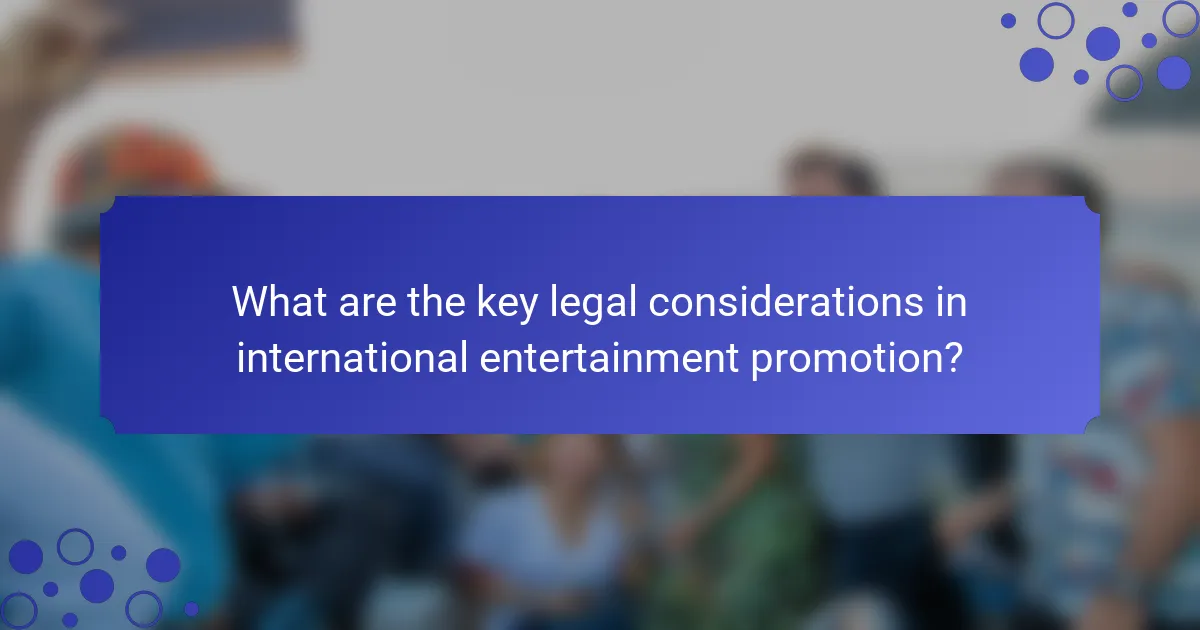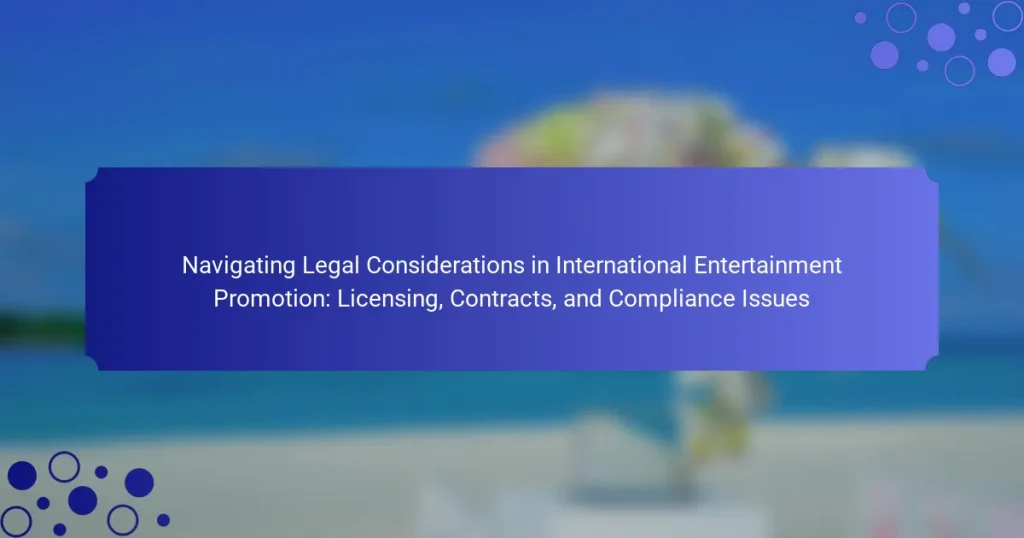The article focuses on the legal considerations involved in international entertainment promotion, emphasizing key aspects such as licensing, contracts, and compliance with local laws. Licensing is essential for legally obtaining rights to use content, while contracts define the obligations and rights of the parties involved. Compliance with varying local regulations is crucial to avoid legal issues, particularly concerning intellectual property rights and tax implications from cross-border transactions. The article also highlights the importance of understanding audience regulations for promotional activities and the need for clearly defined dispute resolution mechanisms within contracts.

What are the key legal considerations in international entertainment promotion?
Key legal considerations in international entertainment promotion include licensing, contracts, and compliance with local laws. Licensing ensures that the rights to use content are legally obtained. Contracts outline the terms between parties involved, including obligations and rights. Compliance with local laws is crucial, as regulations vary by country. Intellectual property rights must be respected to avoid infringement issues. Additionally, tax implications may arise from cross-border transactions. Understanding audience regulations is essential for promotional activities. Finally, dispute resolution mechanisms should be clearly defined in contracts to address potential conflicts.
How do licensing agreements function in the entertainment industry?
Licensing agreements in the entertainment industry allow one party to use another party’s intellectual property. These agreements are crucial for the distribution and commercialization of creative works. They define the scope of usage, including duration, territory, and financial terms. For example, a film studio may license a character for merchandise production. This arrangement typically involves royalty payments based on sales or a flat fee. Licensing agreements protect the rights of creators while enabling broader access to their work. Furthermore, they ensure that both parties benefit financially from the arrangement. The agreements also help in managing brand integrity and quality control.
What types of licenses are commonly used in international entertainment promotion?
Common types of licenses used in international entertainment promotion include performance licenses, synchronization licenses, and mechanical licenses. Performance licenses allow the public performance of music or other works. Synchronization licenses permit the use of music in audiovisual works, such as films or commercials. Mechanical licenses cover the reproduction of music on physical formats like CDs or vinyl. These licenses ensure that creators are compensated for their work globally. Each license type is essential for various aspects of entertainment promotion, facilitating legal use and distribution.
How do licensing terms vary across different countries?
Licensing terms vary significantly across different countries due to local laws and regulations. Each country has its own legal framework governing intellectual property rights. For example, the United States follows the Copyright Act of 1976, which emphasizes the author’s rights. In contrast, countries like Germany adhere to the Urheberrechtsgesetz, which provides moral rights to authors. Additionally, licensing agreements may differ in duration and scope based on national legislation. In some countries, licenses may require renewal after a certain period, while others allow for perpetual licenses. Moreover, cultural norms can influence licensing practices, affecting how rights are negotiated and enforced. Understanding these variations is crucial for compliance in international entertainment promotion.
What role do contracts play in international entertainment promotion?
Contracts serve as legally binding agreements that define the terms of international entertainment promotion. They outline the rights and obligations of all parties involved. This includes artists, promoters, and distributors. Contracts help mitigate risks associated with international transactions. They ensure compliance with local laws and regulations. Specific clauses address payment terms, intellectual property rights, and dispute resolution. Clear contracts foster trust between parties. They are essential for protecting investments and ensuring successful collaborations.
What are the essential components of a contract in this context?
The essential components of a contract in the context of international entertainment promotion are offer, acceptance, consideration, legality, and capacity. An offer is a clear proposal made by one party to another. Acceptance occurs when the other party agrees to the terms of the offer. Consideration refers to something of value exchanged between the parties, which can be money, services, or goods. Legality ensures that the contract’s purpose is legal and not against public policy. Capacity means that both parties must have the legal ability to enter into the contract, typically being of age and sound mind. These components establish a binding agreement enforceable under law.
How can contracts protect the interests of parties involved?
Contracts protect the interests of parties involved by clearly outlining the rights and obligations of each party. They establish legally binding agreements that detail what is expected from each side. This clarity helps to prevent misunderstandings and disputes. Contracts also include provisions for conflict resolution, which can expedite the process of addressing any issues that arise. Furthermore, they often specify remedies for breach of contract, providing a clear course of action if one party fails to meet their obligations. The enforceability of contracts in courts adds an additional layer of protection for all parties involved. This legal framework ensures that parties can rely on their agreements to safeguard their interests.
Why is compliance important in international entertainment promotion?
Compliance is crucial in international entertainment promotion to ensure adherence to various legal standards. It helps avoid legal penalties that can arise from violations of copyright, trademark, and licensing laws. Non-compliance can lead to costly lawsuits and damage to brand reputation. Different countries have unique regulations governing entertainment content. Understanding these regulations is essential for successful market entry. For instance, failure to comply with local content laws can result in content being banned or removed. Compliance also fosters trust with local partners and audiences. It ensures that promotional efforts align with cultural sensitivities and legal requirements. Ultimately, compliance protects both financial investments and creative integrity in the global marketplace.
What are the common compliance issues faced in this industry?
Common compliance issues in the international entertainment promotion industry include copyright infringement, licensing violations, and contract disputes. Copyright infringement occurs when promotional materials use protected content without permission. Licensing violations arise when promotional activities do not adhere to the terms set forth in licensing agreements. Contract disputes often stem from unclear terms or unmet obligations in agreements between parties. Additionally, compliance with local regulations can vary significantly across different jurisdictions. This inconsistency can lead to legal challenges and potential penalties. Understanding these issues is crucial for successful promotion in the entertainment sector.
How can organizations ensure compliance with international laws?
Organizations can ensure compliance with international laws by implementing comprehensive legal frameworks. They should conduct regular audits of their operations to identify potential legal risks. Establishing clear policies and procedures that align with international regulations is essential. Training employees on relevant laws and compliance practices enhances awareness. Engaging legal experts familiar with international law provides valuable guidance. Additionally, organizations must stay updated on changes in legislation across jurisdictions. Utilizing compliance management systems can streamline adherence to laws. Regularly reviewing contracts for compliance can prevent legal disputes.
What challenges arise when navigating legal considerations in this field?
Navigating legal considerations in international entertainment promotion presents numerous challenges. One significant challenge is the complexity of varying laws across different jurisdictions. Each country has its own regulations regarding licensing, contracts, and intellectual property rights. This can lead to confusion and potential legal conflicts. Additionally, compliance with international treaties and agreements is often required. Failure to adhere to these can result in penalties or legal disputes. Another challenge includes the negotiation of contracts, which can be complicated by differing legal standards. Misunderstandings in contract terms can lead to disputes and financial losses. Furthermore, cultural differences may impact legal interpretations and enforcement. This adds another layer of difficulty in ensuring compliance and understanding legal obligations.
How do cultural differences impact legal considerations?
Cultural differences significantly impact legal considerations by shaping laws and regulations in various jurisdictions. These differences influence contract interpretations, dispute resolutions, and compliance requirements. For example, collectivist cultures may prioritize group consensus in legal agreements, while individualistic cultures may emphasize personal rights. Additionally, cultural norms dictate acceptable business practices, affecting negotiation styles and enforcement of contracts. Research indicates that misunderstandings arising from cultural differences can lead to legal disputes, as seen in international business cases. Understanding these cultural nuances is essential for effective legal navigation in international entertainment promotion.
What are the risks of non-compliance in international entertainment promotion?
Non-compliance in international entertainment promotion can lead to significant legal and financial risks. These risks include hefty fines imposed by regulatory bodies. For instance, violating copyright laws can result in penalties that may reach millions of dollars. Additionally, non-compliance can damage a brand’s reputation, leading to loss of trust among consumers and partners. Legal disputes may arise, resulting in costly litigation and potential shutdowns of promotional activities. Furthermore, non-compliance can restrict market access in specific countries, limiting growth opportunities. Companies may also face increased scrutiny from authorities, leading to more stringent regulations in the future. Overall, the risks of non-compliance can severely impact both the financial and operational aspects of international entertainment promotion.
How can professionals effectively manage legal aspects in international entertainment promotion?
Professionals can effectively manage legal aspects in international entertainment promotion by understanding and adhering to local laws. This includes copyright laws, contract regulations, and licensing requirements specific to each country. They should conduct thorough research on the legal frameworks governing entertainment in target markets. Engaging local legal experts can provide valuable insights into compliance and risk management. Drafting clear contracts that specify rights, obligations, and dispute resolution mechanisms is essential. Additionally, keeping abreast of international treaties and agreements can help navigate cross-border issues. Proper legal management minimizes risks and ensures smooth operations in diverse jurisdictions.
What best practices should be followed when drafting contracts?
Best practices for drafting contracts include clarity, specificity, and comprehensiveness. Clarity ensures that all parties understand the terms and obligations. Specificity addresses the exact details of the agreement, such as payment terms and deadlines. Comprehensiveness involves including all necessary clauses to protect the interests of all parties.
Additionally, using plain language can reduce misunderstandings. It is essential to define key terms within the contract. Including a dispute resolution clause can provide a clear process for handling conflicts. Finally, having legal counsel review the contract can help identify potential issues and ensure compliance with applicable laws. These practices enhance the enforceability and effectiveness of contracts in international entertainment promotion.
How can one stay updated on international legal changes affecting entertainment promotion?
One can stay updated on international legal changes affecting entertainment promotion by subscribing to legal newsletters and journals. These publications often provide timely updates on relevant legislation and case law. Additionally, attending industry conferences and webinars can offer insights from legal experts. Following reputable law firms and organizations on social media can also ensure access to the latest information. Regularly checking government and regulatory agency websites is crucial for official announcements. Engaging with professional networks can facilitate discussions on legal trends. Utilizing legal research platforms can help in tracking changes in laws across different jurisdictions.
What resources are available for navigating legal considerations in this industry?
Legal resources for navigating considerations in international entertainment promotion include industry-specific legal guides, professional associations, and legal counsel. Industry-specific legal guides provide comprehensive information on licensing and compliance issues. Professional associations, such as the International Entertainment and Media Association, offer networking and educational resources. Legal counsel specializing in entertainment law can provide tailored advice. Additionally, online platforms like LegalZoom offer templates for contracts and compliance checklists. These resources help ensure adherence to legal standards in the entertainment industry.
Which organizations provide guidance on licensing and compliance?
The organizations that provide guidance on licensing and compliance include the International Federation of the Phonographic Industry (IFPI) and the Recording Industry Association of America (RIAA). The IFPI offers resources for music licensing across various countries. The RIAA provides information on copyright laws and compliance in the United States. Additionally, the World Intellectual Property Organization (WIPO) offers international guidelines on intellectual property rights. These organizations are recognized for their expertise in navigating legal frameworks related to entertainment promotion.
What tools can assist in contract management for international promotions?
Contract management tools for international promotions include software like ContractWorks, DocuSign, and Agiloft. ContractWorks offers secure storage and easy access to contracts. DocuSign enables electronic signatures and streamlines the approval process. Agiloft provides customizable workflows and templates for managing contracts. These tools enhance collaboration across different regions. They ensure compliance with international regulations. Many organizations rely on these tools for efficiency. They help track contract deadlines and obligations effectively.
What are the common pitfalls to avoid in international entertainment promotion?
Common pitfalls to avoid in international entertainment promotion include failing to understand local regulations. Different countries have unique laws governing content distribution and promotion. Neglecting to secure proper licensing can lead to legal issues. Not adapting marketing strategies to local cultures may result in poor audience engagement. Overlooking the importance of translation can cause misunderstandings in messaging. Ignoring local partnerships can limit market reach and effectiveness. Lastly, underestimating the impact of digital rights management can hinder content accessibility.
The main entity of the article is international entertainment promotion, focusing on the legal considerations such as licensing, contracts, and compliance issues. Key aspects include the functioning of licensing agreements, the types of licenses used, and how licensing terms vary across countries. The article also addresses the importance of contracts in defining rights and obligations, as well as the common compliance issues faced by organizations. Additionally, it highlights the risks of non-compliance, the impact of cultural differences, and best practices for managing legal aspects effectively in this industry.


